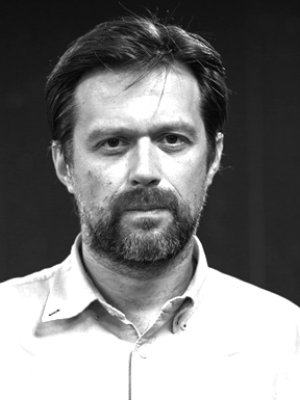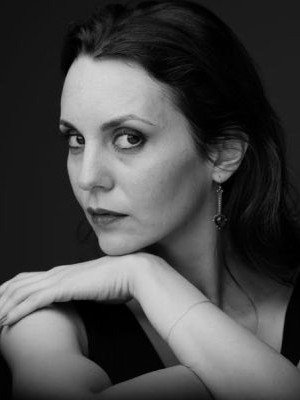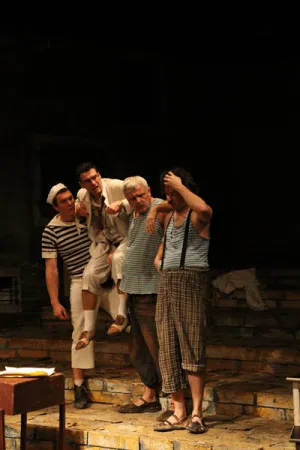Squabbles at chioggia
comedy by Carlo Goldoni

GOLDONI’S THE FISHERMEN’S QUARRELS IN THE NATIONAL THEATRE
Goldoni’s The Fishermen’s Quarrels (or The Chioggia Scuffles) had their first premiere in Venice in 1762. The play premiered for Belgrade audience for the first time on 10 April 1948, when the newly established Yugoslav Drama Theatre had the great Bojan Stupica produce it with much success. The play was produced only once in the 135 year long history of the National Theatre. Paolo Magelli, an Italian who lived and worked in Belgrade for twenty years, produced the comedy in 1973 on the Stage in Zemun. It had not been a year since his remarkable success with Machiavelli’s The Mandrake on the same stage. This time, Magelli’s third production for Belgrade audiences, achieves the same result – enchanted audiences, strong applauses and praises by the critics. Magelli’s unusual imagination, lack of convention and Mediterranean temper has triumphed with Belgrade theatregoers. The Fishermen’s Quarrels was one of his “cult” productions. Goldoni’s characters come from a small fishermen’s village near Venice, while the translation by Ivo Tijardović makes them speak like Dalmatian fishermen; therefore, “with joyous and more than joyous acting” and “the language, dialect with which Ivo Tijardović moved The Fishermen’s Quarrels from one to another side of the Adriatic Sea“ make the production extremely likable. Karlo Bulić helped his colleagues, the actors, with the specific dialect: he interpreted the role of Padron Toni in the production of the Yugoslav Drama Theatre. Magelli created “the ballad about underprivileged people based on theory of Brechtian theatre”, as he used to say and found inspiration in Commedia dell’Arte and in Brecht’s theatre of alienation, which made him uncertain about the reception of the play with audiences. Everything happens furiously fast, everything is moving, both actors and décor and parts of décor. There is a swift change of strangely united different styles: acrobatics and choreography, grotesque and burlesque, “bodily lightness” and “language harshness”, “ridiculousness of constant arguing” and “philosophic issues of human lives”, metaphors and physical and verbal gags, stage improvisations, abundance of effects, but also “the power to generalise and make things typical”… Magelli manages to “express the poetry of poorness with almost Fellinian force and opens beauty, tragedy and force of simple people’s lives, anchored between bread, poverty, love and fantasy”. Atmosphere of a small place where living “means to dance, speak, shout and quarrel,” where quarrelling is the favourite way of communication and having fun and the basic poetics of life, the director sees “with Brecht’s eyes: the effects of alienation of the poor, as well as those who interpreted them, and possesses the demonic force of revolution”. The comments from reviews: “Magelli has searched for Goldoni’s realism where it should be searched, not in the superficial imitation of life, but in realism of the theatre and the realism of what is being presented on stage and the manner to do it, in the usefulness of theatre means which the director uses in creation of the production. With a lot of fantasy and shrewdness, Paolo Magelli designs his production in this spirit (for instance Vahtang’s) by fusing psychological accuracy and theatrical effects. The director felt the spirit of Goldoni’s theatre which is “a unity of ‘imaginary’ and sharp observation, closeness to life and aptitude to play, which cannot be achieved with naturalistic means nor through ‘abundance in acting usually observed when interpretation of Mediterranean temperament is concerned’, but with ‘lightness’, through ‘reserved, discrete humour”. Such a concept is being followed by Dušan Ristić’s set design, whom the critics have named the “co-director” and who designed the stage as “the battleground of a game where everything is mobile, but with hidden agenda to ‘depict’ a fishermen’s village at the seaside” and whose décor was “superb, both as a place to nurse Magelli’s idea and a pastel and poor seashore place, which kept its joy”. Costumes designed by Ljerka Kalčić are “truly creative” and in function of the production at the same time, as well as the expressive make-up. Music score by Vojislav Voki Kostić has also successfully served to the director as “means of theatre”, Zvonimir Jovčić was the assistant director. Magelli’s choice of actors seems unusual. Besides Miloš Žutić, who has only rarely played in comedies, most members of the cast comprised of artists who did not work a lot at the time, as well as young and inexperienced actors. Today, their names prove how much this young Italian director had “the eye and the ear” for the company. They were: Olivera Marković (Libera), Milka Lukić (Pasqua), Stanislava Pešić (Ursula), Dobrila Stojnić (Lucietta), Zorica Mirković (Checca), Dragan Šaković (Padron Vicencio), Predrag Tasovac (Igge), Miloš Žutić (Padron Fortunato), Dragan Maksimović (Beppo), Predrag Miki Manojlović (Ivanko), Rastko Tadić (Padron Toni), Bogić Bošković (Krište), Bogdan Mihajlović (Bailiff) and Zvonimir Jovčić (The Straw, seller of marrons). They all “glowed and acted impeccably, with subtle feeling for everything they interpreted” and “just like Goldoni, ‘caught life in motion’ making a dialogue into ‘a speech action’”. Although one “could notice three equally justifiable approaches” in their acting, the whole ensemble followed the director’s idea and achieved a remarkably balanced acting in the play. “When Olivera’s Libera shouts then whole of her being ‘shouts’, it is overwhelming how this quarrelling ‘bigmouth’ and the ‘duchess in slippers’ complains and roars, the simple-minded Falstaf’s sister. Miloš Žutić has created his character as confused, stuttering and choked Padron Fortunato with the means of reduced and yet rich expression. Trembling, Padron Fortunato is unusually self-sufficient; themes change with every appearance of such citizen-fisherman under the hood of a spoiled Viking… Miki Manojlović interpreted his role as a comical and playful highlander; Milka Lukić is a carnival cocotte, Bogić Bošković’s character is striving to achieve something in life; Predrag Tasovac is a comedian dressed in silk; Bogdan Mihajlović who knows how to play and observe the game; Zvonimir Jovčić as a grotesque passer-by whose bag with marrons initiate the carnival confusion of intricate poetic meanings by the director Paolo Magelli!” On different occasion the same critics gives overwhelming comments, “Everything is playful and everything dances: houses and stalls, slippers and trainers, wigs and masks, feathers and fabric, egg whites and yolks, knives and axes, fingers and toes. Choreography becomes the acting expression of Rastko Tadić; circus-like weirdness of Padron Vicencio by Dragan Šaković; dressed-up and plump lady in the children’s mask parade is richly played by Zorica Mirković as Ursula, and Dobrila Stojnić achieves cabaret expression in the role of Lucietta. Remarkable roles of courage and poetical have been played by Miloš Žutić and Olivera Marković. The first one in the role of Padron Fortunato whom “no one can understand”, who avoids any sort of communication by not engaging in a quarrel and ‘overcoming’ any dispute, and the latter one as a proper fisherman’s wife who engages in arguments out of boredom by ‘directing’ any quarrel as a carnival play; Predrag Tasovac is remarkable in the role of self-important and chatty character of Judge Igge.” Another critic states, “Miloš Žutić and Miki Manojlović focus on remarkably authentic and expressive physical action, while Predrag Tasovac effectively achieves balance between caricature and realistic, Olivera Marković and Milka Lukić manage to reveal comical under psychologically justified reactions of their characters.” Let us finish this story about “a great joke, theatrical to the sky and philosophical to the last line” directed by Paolo Magelli on the stage of the National Theatre three decades ago, with words of The Večernje Novosti critic, “This was a European performance!”
Jelica Stevanović
(...) Applauses, cheers, joy to the ceiling… It was the best way to finalise the season in the National Theatre Drama. Other projects have been paid and praised before they were even realised and they were finalised unsuccessfully or not at all, and here they come, in Mediterranean confusion on the days when the south wind blows and wakes up and stirs dormant emotions. Crazy with laughter and fighting, in the most demanding discipline of Commedia dell’Arte, they bring joy to a viewer with their collective efforts and indicate that there are cleverer directors than those who, from a project into a project, try to no avail to prove so. It is remarkable to see such abundance of characters in a single performance, in the style of great actresses, by Marija Vicković, Zlatija Ivanović and Nada Šargin, the three gracias of comedy, for whom a new, special, title of the season should be invented. The rest of the cast deserve praises as well, but unfortunately, TV time is cruel...
Branka Krilović, RTS NEWS
Premiere performance
Premiere, 4 Jun 2003 / “Raša Plaović” Stage
Author of the adaptation and Director Goran Ruškuc
Dramaturge Molina Udovički Fotez
Set Designer Boris Maksimović
Costume Designer Bojana Nikitović
Composer Ivan Brkljačić
Editor Aljoša Vučković
Stage Movement Designer Ivica Klemenc
Premiere Cast:
Toni Lepomir Ivković
Pasqua Nada Blam
Fortunato Vladan Gajović / Zoran Ćosić
Libera Anđelka Tadić
Lucietta Marija Vicković
Beppo Nenad Maričić
Checca Zlatija Ivanović / Bojana Stefanović / Milena Đorđević
Ursula Nada Šargin
Ivanko Branislav Tomašević / Miloš Đorđević
Krište Mihailo Lađevac
Igge Igor Đorđević
Producers Milorad Jovanović, Miloš Lazić
Stage Manager Vlastimir Živanović
Prompter Dušanka Vukić
Assistant Costume Designer Nevenka Milosavljević
Make-Up Designer Dragoljub Jeremić
Lighting Master Srđan Mićević
Sound Master Perica Đurković
Stage Master Zoran Mirić
Painters Svetislav Živković, Ilija Krković, Srđan Pušeljić
Sculptors Stanimir Pavlović, Borislav Stojiljković
Props Dejan Janković, Zoran Ilić, Dragoljub Denić
Head Wardrobe Supervisor of the “Raša Plaović” Stage Radivoje Đurđević
Wardrobe Supervisors Mirjana Kuzmanović, Dejan Agatonović, Gordana Mitić
Sets and costumes have been made in the National Theatre’s workshops under supervision of Ž. Rudić, D. Ognjenović, Lj. Sekulić, D. Drinić, B. Zarić, R. Komazec, R. Kosanović























































